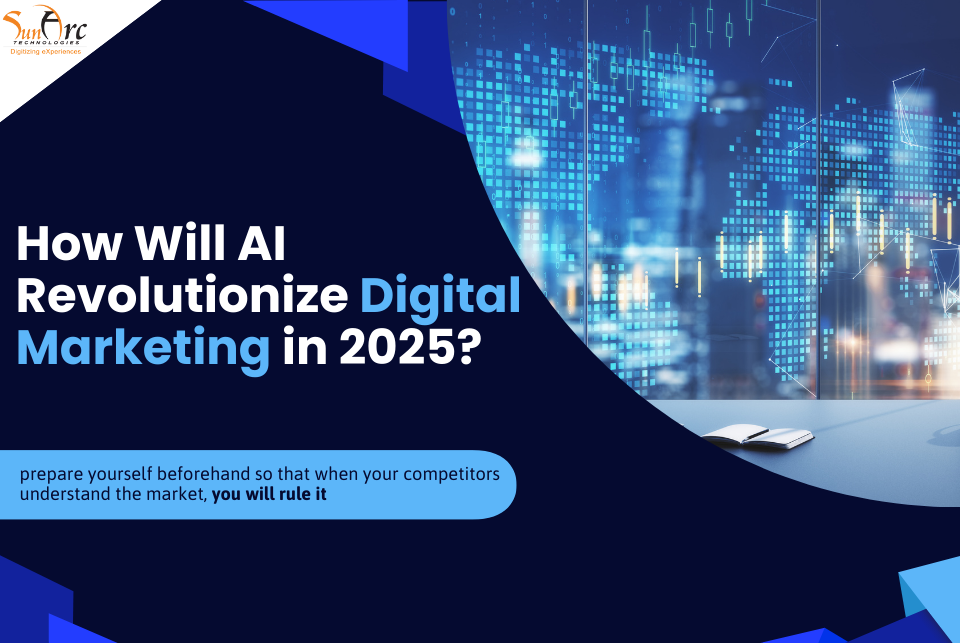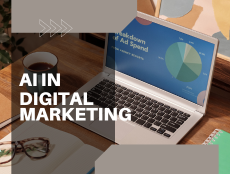Yes, there was a time when Artificial Intelligence (AI) was a futuristic concept, but now it is a central pillar that has created a stir in the worldwide market.
When talking about AI in digital marketing, brands are now finding innovative ways to connect with their audiences by integrating AI with marketing strategies.
Be it creating tailored strategies by analyzing audience data or automating digital marketing processes, every task has become easy now.

Now, as we said, the task has become easy, but the other side of the coin is that competition has grown fiercer.
So, the sooner you understand this changing market, the quicker you will be able to create new strategies.
So today, in this blog, we will talk about how AI is going to transform digital marketing in 2025.
Based on the given factors, you can prepare yourself beforehand so that when your competitors understand the market, you will rule it.
How AI is Revolutionizing Digital Marketing in 2025?
1. Hyper-Personalized Customer Experiences
AI’s ability to process and analyze large volumes of data in real time has taken personalization to new heights.
According to a study by Salesforce, 76% of customers expect companies to understand their needs and expectations, and AI-driven personalization makes this possible by delivering tailored content, product recommendations, and marketing messages at scale.
How It Works:
- Behavioral Data: AI algorithms collect and analyze behavioral data such as browsing habits, social media interactions, and past purchases.
- Predictive Analytics: Based on this data, AI can predict what products a customer is likely to purchase next or what content will resonate best.
Example:
- AI marketing tools like Dynamic Yield and Optimizely are enabling brands to offer highly tailored shopping experiences by adapting website layouts, email content, and even pricing strategies in real time.
Table: How AI Personalizes Marketing
| AI Tools | Personalization Features | Brands Utilizing AI |
| Dynamic Yield | Product recommendations, A/B testing, behavioral targeting | McDonald’s, Sephora |
| Optimizely | Website personalization, content experimentation | eBay, Walmart |
| Marketo Engage | AI-driven email campaigns, lead nurturing | GE, Panasonic |
2. AI-Driven Content Creation and Optimization
Creating valuable, SEO-optimized content that speaks to your target audience can be a time-consuming process.
In 2025, AI marketing tools like Jasper and Writesonic are producing content that rivals human writers.
These tools help marketers generate blog posts, social media updates, product descriptions, and even ad copy based on predefined parameters. But if you become completely dependent on these tools for content creation, you may suffer losses. Use these tools to craft outlines, and get ideas, but avoid the complete copy-paste.
Why It Matters:
- Content at Scale: AI allows businesses to generate thousands of pieces of content across various channels in a fraction of the time.
- SEO Optimization: AI tools can automatically integrate SEO best practices, ensuring that the content ranks higher on search engines.
Example: AI-driven platforms like Surfer SEO analyze the top-performing pages for a given keyword and suggest improvements, helping marketers create content that ranks higher on search engines.
3. Smarter Ad Targeting with AI
AI’s data-processing capabilities enable more precise ad targeting, which translates into better return on investment (ROI) for businesses.
Traditional ad targeting methods are being replaced by AI-powered solutions that predict consumer behavior based on historical data.
According to Statista, the global AI in digital advertising market is projected to exceed $107 billion by 2028, reflecting the growing reliance on AI to drive paid media strategies.
(Image Source: Statista)
Benefits of AI in Ad Targeting:
- Reduced Ad Spend: By targeting the right audience at the right time, businesses minimize wasted ad spend.
- Real-Time Adjustments: AI can automatically adjust campaigns based on performance, ensuring optimal results.
AI Tools for Ad Targeting
- Google Ads Smart Bidding: Leverages machine learning to optimize bids for conversions.
- AdRoll: Uses AI to predict when a customer is likely to convert and targets ads accordingly.
AI-Powered Chatbots for 24/7 Customer Support
By 2025, AI chatbots have evolved to provide seamless customer service.
According to Gartner, 25% of customer service operations will use AI-powered virtual assistants by 2025, reducing operational costs by up to 30%.
Key Advantages:
- Cost Efficiency: Businesses save on manpower by automating routine inquiries.
- 24/7 Availability: AI chatbots provide real-time assistance, improving customer satisfaction.
Popular AI Chatbots:
- Intercom: Helps businesses automate lead generation and customer support.
- Drift: AI-driven chatbots that qualify leads and assist customers around the clock.
Voice Search Optimization with AI
As smart devices and voice assistants like Amazon Alexa and Google Assistant become more integrated into daily life, optimizing for voice search is critical.
Comscore predicts that 50% of searches will be voice-based by 2025.
AI is making it possible to create SEO strategies that cater specifically to voice queries, focusing on natural language and conversational keywords.
Why It Matters:
- Higher Search Volume: With more users relying on voice search, businesses that optimize for this will gain visibility.
- Conversational Content: AI tools help marketers identify and optimize content for questions typically asked via voice.
Challenges and Considerations
Despite the benefits, there are challenges associated with AI in digital marketing:
Data Privacy: With regulations like GDPR and CCPA, businesses must navigate the fine line between personalization and privacy invasion. The reliance on AI means handling large amounts of consumer data responsibly.
Over-Automation: Too much automation may lead to a lack of human touch, which can make marketing efforts feel impersonal. Businesses must find a balance between AI-driven efficiency and maintaining customer trust.
Conclusion
By the year 2025, artificial intelligence will represent the driving force behind many different elements of digital marketing, including hyper-personalized customer experiences and more intelligent ad targeting.
However, despite the vast opportunities, businesses must also be aware of the challenges, which include concerns regarding the privacy of their customers’ data and an excessive reliance on automation.
Above all, businesses that are able to successfully combine the capabilities of artificial intelligence with the creativity of humans are going to succeed in this changing environment.
At SunArc Technologies, we have the right tools, the right team, and the right tech to turn your strategy into pure marketing magic.
Want to see your ROI skyrocket faster than your morning caffeine boost? Let’s talk. We promise—no bots, just brilliant results!

